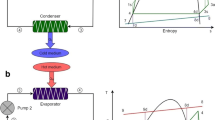Abstract
In this paper, an approach to optimize set points is proposed for controlled Organic Rankine Cycle (ORC) systems. Owing to both disturbances and variations of operating point existing in ORC systems, it is necessary to optimize the set points for controlled ORC systems so as to improve the energy conversion efficiency. At first, the optimal set points of controlled ORC systems are investigated by revisiting performance analysis and optimization of ORC systems. The expected set points of the evaporating pressure and the temperature at evaporator outlet are then determined by combining genetic algorithm with least squares support vector machine (GA-LSSVM). Simulation results show that the predicted results by GA-LSSVM can be regarded as the optimal set points of controlled ORC systems with varying operating conditions.










Similar content being viewed by others
References
Tchanche BF, Lambrinos G, Frangoudakis A et al (2011) Low-grade heat conversion into power using Organic Rankine Cycles—a review of various applications. Renew Sustain Energy Rev 15:3963–3979
Hung TC, Shai TY, Wang SK (1997) A review of Organic Rankine Cycles (ORCs) for the recovery of low-grade waste heat. Energy 22:661–667
Liu BT, Chien KH, Wang CC (2004) Effect of working fluids on Organic Rankine Cycle for waste heat recovery. Energy 29:1207–1217
Mago PJ, Chamra LM, Srinivasa K et al (2008) An examination of regenerative Organic Rankine Cycles using dry fluids. Appl Therm Eng 28:998–1007
Quoilin S, Declaye S, Tchanche BF et al (2011) Thermo-economic optimization of waste heat recovery Organic Rankine Cycles. Appl Therm Eng 31:2885–2893
Dai YP, Wang JF, Gao L (2009) Parametric optimization and comparative study of Organic Rankine Cycle (ORC) for low grade waste heat recovery. Energy Convers Manage 50:576–582
Roy JP, Misra A (2012) Parametric optimization and performance analysis of a regenerative Organic Rankine Cycle using R-123 for waste heat recovery. Energy 39:227–235
Roy JP, Mishra MK, Misra A (2011) Parametric optimization and performance analysis of a regenerative Organic Rankine Cycle using low–grade waste heat for power generation. Int J Green Energy 8:173–196
Roy JP, Mishra MK, Misra A (2010) Parametric optimization and performance analysis of a waste heat recovery system using Organic Rankine Cycle. Energy 35:5049–5062
Hung TC (2001) Waste heat recovery of Organic Rankine Cycle using dry fluids. Energy Convers Manag 42:539–553
Sun J, Li WH (2011) Operation optimization of an Organic Rankine Cycle (ORC) heat recovery power plant. Appl Therm Eng 31:2032–2041
Quoilin S, Aumann R, Grill A et al (2011) Dynamic modeling and optimal control strategy of waste heat recovery Organic Rankine Cycles. Appl Energy 88:2183–2190
Zhang JH, Zhou YL, Wang R et al (2014) Modeling and constrained multivariable predictive control for ORC (Organic Rankine Cycle) based waste heat energy conversion systems. Energy 66:128–138
Mustaffa Z, Yusof Y, Kamaruddin SS (2013) Enhanced artificial bee colony for training least squares support vector machines in commodity price forecasting. J Comput Sci 5:196–205
Suykens JAK, Vandewalle J (1999) Least squares support vector machine classifiers. Neural Process Lett 9:293–300
Wu CH, Tzeng GH, Lin RH (2009) A novel hybrid genetic algorithm for kernel function and parameter optimization in support vector regression. Expert Syst Appl 36:4725–4735
Yang Z, Gu XS, Liang XY et al (2010) Genetic algorithm-least squares support vector regression based predicting and optimizing model on carbon fiber composite integrated conductivity. Mater Des 31:1042–1049
Acknowledgements
This work was supported by the National Basic Research Program of China (2011CB710706) and the National Natural Science Foundation of China (51210011, 61374025).
Author information
Authors and Affiliations
Corresponding author
Additional information
SPECIAL TOPIC: Deep Utilization of Boiler Low-Temperature Flue Gas
About this article
Cite this article
Zhang, J., Lin, M., Shi, F. et al. Set point optimization of controlled Organic Rankine Cycle systems. Chin. Sci. Bull. 59, 4397–4404 (2014). https://doi.org/10.1007/s11434-014-0590-1
Received:
Accepted:
Published:
Issue Date:
DOI: https://doi.org/10.1007/s11434-014-0590-1




